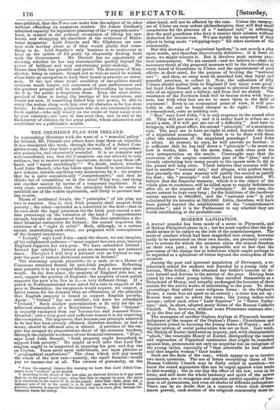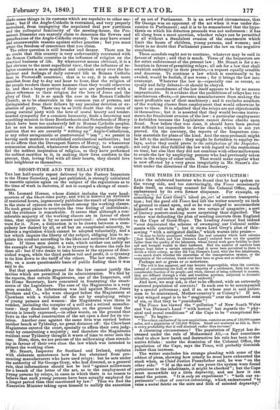MODERN LAPIDATION.
A GREAT scandal has been made of a scene in Plymouth, and of Bishop Philpotts's share in it ; but we must confess that the dis- credit seems to lie rather on the side of the scandalmongers. The traits of conduct which had been magnified into crimes, however justly to be questioned on their own merits, are precisely correla- tive to actions for which the accusers claim the utmost freedom on their own part ; and it is impossible not to feel that the gravamen of the charge lies in behaviour which ought perhaps to be regarded as a splendour of virtue beyond the conception of the accusers.
Among the poor and ignorant population of Devonport, a re- sidentiary school for orphans was founded by a young lady of fortune, Miss Sellon ; who obtained her father's consent to de- vote herself and fortune to the service of the poor. Having been joined by two other young ladies, they enrolled themselves as a Sisterhood of Mercy, and actually exchanged the luxuries of their station for the active works of ministering to the poor. To these proceedings they added some religious forms : in the Orphan's Home, a room was set apart as an oratory ; a cross was set up ; flowers were used to adorn the room; the young ,ladies wore crosses ; called each other" Lady Superior" or "Sister Cathe- rine," and, in short, adopted many forms of the Roman Catholic Church. Not, however' without some Protestant customs also; as in the free use of the Bible.
The managers of another Orphan Asylum at Plymouth became indignant at the usages of the Orphan's Home ; Churchmen and Dissenters joined in accusing the young ladies of Popery ; and a regular system of social persecution was set on foot. Last week, the Bishop of Exeter instituted an inquiry, and, with characteristic "pluck," the venerable Henry of Exeter, disregarding the taunts and reproaches of Papistical tendencies that might be launched against him, pronounced not only an acquittal but an eulogium of the young ladies, especially of "that admirable he had almost said that angelic woman" their leader. Such are the facts of the case ; which appear to us to involve two main questions. The use of forms resembling those of the Roman Catholic Church may be fairly called in question—we know the sound arguments that can be urged against what tends to idol-worship ; but in our day the effect of the law, even in its letter, and still more the whole tendency and spirit of the newer enactments, are to recognize and sanction perfect equality of free- dom to all persuasions, and even all shades of different persuasions. There can be no doubt that in a country where such diverse tenets prevail, each section of the religious community must in- dude some things in its customs which-are repulsive to other sec- tions; but if the Anglo-Catholic is restrained, and very properly restrained, from impugning the unpainted deal pew partitions and the colloquial familiarity of the meeting-house, the Pro- testant Dissenter can scarcely claim to denounce the flowers and genuflexions of the Anglo-Catholic oratory. You may have sound and unanswerable reasons against either practice ; but you must grant the freedom of conscience that you claim. The other.question is still broader and deeper. There can be no doubt that this country is very unfavourably contrasted with the Roman Catholic countries in the influence of religion on the practical business of life. By whatsoever means obtained, it is a fact obvious to the most superficial view, that the influence of re- ligion exercises a more manifest and constant sway over the be- haviour and feelings of daily outward life in Roman Catholic than in Protestant countries; that is to say, it is made more manifest from day to day and hour to hour, that the religion of the people renders them more humane than they would otherwise be, and that a larger portion of their acts are performed with a direct reference to their religion for the love of Jesus and the glory of God. It is so much the case in the Roman Catholic Church, as to be observable in the common run of persons, not distinguished from their fellows by any peculiar devotion or ex- altation of piety. There can be as little doubt that the union of strong natural piety with the love of moral beauty and tender- hearted sympathy for a common humanity, finds a becoming and ennobling mission in those Brotherhoods and Sisterhoods of Mercy which hate been too exclusively left to Roman Catholic peoples. Let us not be misunderstood : we distinctly repudiate the sup- position that we are covertly " writing up" Anglo-Catholicism, or any other antagonistic or controversial " ism" ; we persist in leaving such matters to established ecclesiastical authorities; but we do affirm that the Devonport Sisters of Mercy, to whatsoever communion attached, whatsoever form observing, have exempli- fied the noblest inspiration of religion, as they have performed the noblest sacrifice to it, in making their lives conform to the precept, that, loving God with all their hearts, they should love their neighbour as themselves.



























 Previous page
Previous page